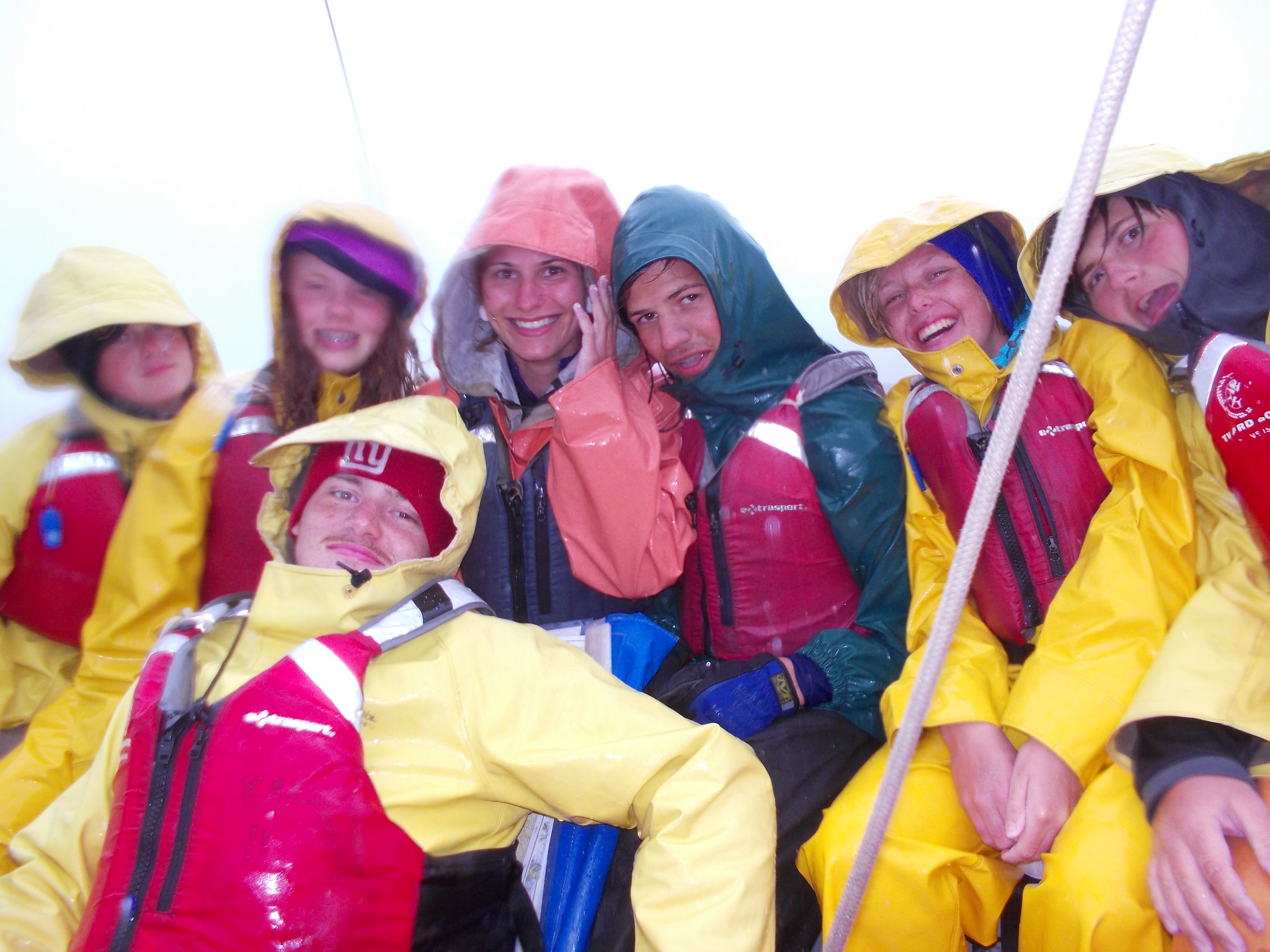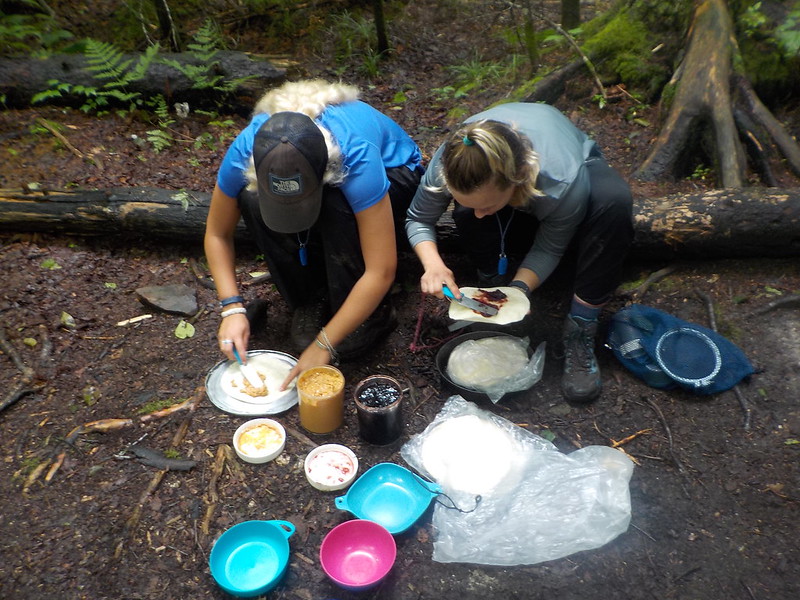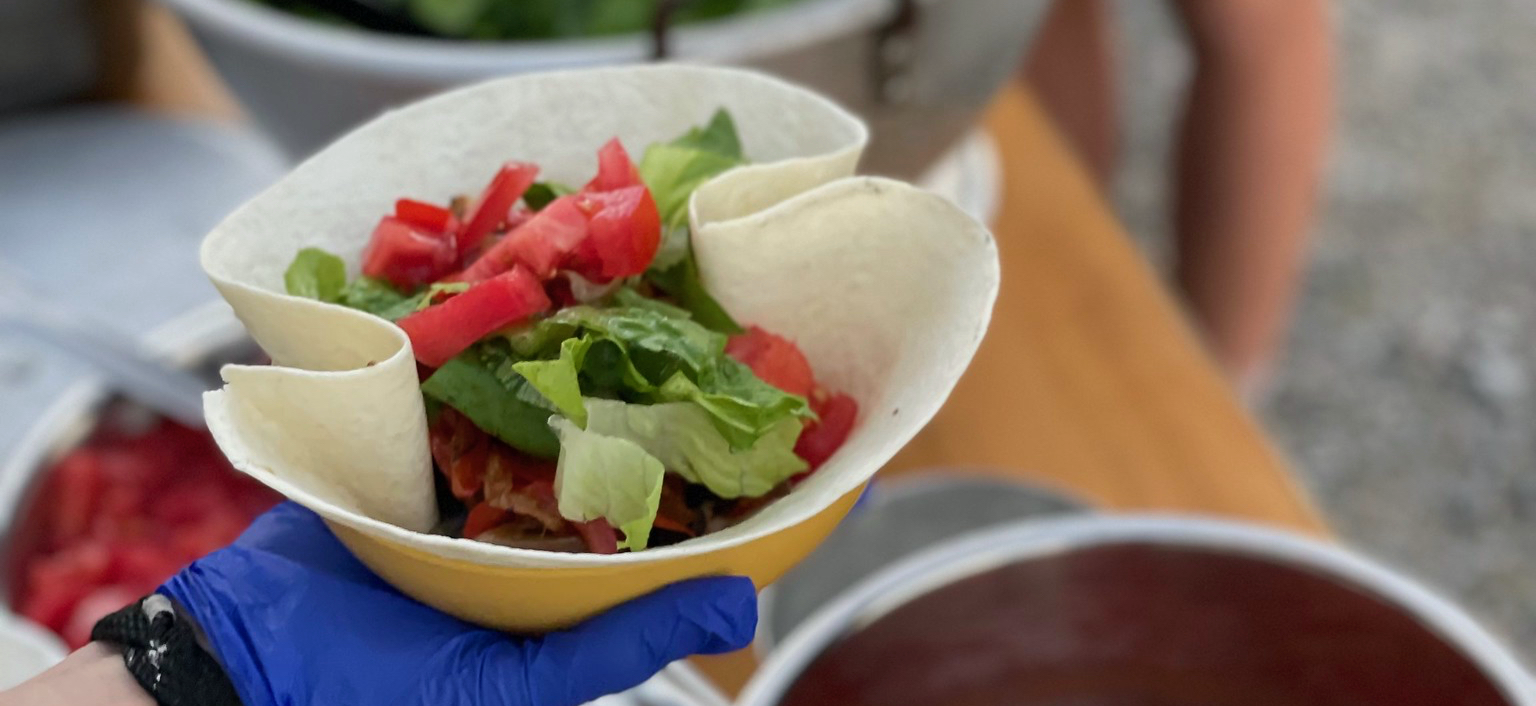What to Expect on Course

A typical day usually means getting up early, making breakfast, taking down shelters, planning the route and then traveling most of the day, stopping occasionally for breaks, lunch and lessons along the way. Once you reach that day’s destination, group members divide and conquer to get dinner cooked and shelters set up. After dinner you may meet to discuss the next day’s plans, or to discuss leadership and teamwork methods before crawling into your sleeping bag for a well-deserved rest. What do we do on days when it rains? It’s the same, with rain-gear on.
Phases of Expedition
The essential goal of any Outward Bound course is for the students to learn autonomy. Our expedition curriculum supports this happening in a progressive way. During the first third of a course (a phase called “training expedition”), the instructors are very present in the group. They teach outdoor skills, the technical aspects of the activities and guide the students as they form a team. In the middle third of the course (what we call the “main expedition”), the instructors take a step back so students may step forward. Students begin to teach what they’ve already learned to each other, and experiment with applying basic skills to bigger challenges. The instructors continue to coach and support as the students practice leadership roles. When the group meets a particular situation, environment or activity they haven’t learned about before, the instructors jump back in and teach. Each time this happens, the group reaches competency more quickly. By the last third of the course (the “final expedition”), students are the stars of the show. They are applying what they know, leading each other, setting goals, and solving problems collaboratively. The instructors are close by and ready to step back in to prevent a safety issue from occurring but will let students find their own resiliency when they make mistakes, and ensure they feel the full spotlight of success when they meet their goals.
To learn more about how we manage risks and safety, click here.
Group living

Living and working with a small group is an opportunity to make lifelong friends and create memories that will last a lifetime. It is also often a source of friction and challenge. You may feel frustration or annoyance with your teammates at times as your group attempts to set and meet your goals, and make decisions big and small.
Our students are diverse in their backgrounds and previous experience, and everyone reacts to challenges differently. It is essential to come ready to work as a team, be inclusive, offer help to others, and ask for it when you need it!
All courses are co-ed unless otherwise published, but there is no guarantee that a course will attract a mixed-gender group. All students go through an admissions screening process, and we make every effort to ensure that all participants are capable of attending, contributing to, and successfully completing their course.
Camp chores

Because this is an experiential course and not a guided trip, all group members will pitch in to do all camp chores, including cooking, washing pots, setting up tents and organizing food and equipment.
You’ll find that as the expedition progresses, your mastery of these camp craft skills will enable you to operate more efficiently and effectively around camp. Students participate in cleaning and repairing equipment at course end, readying it for use by the next group.
Food

All students take turns preparing hot, tasty meals on Outward Bound courses, initially with coaching from the instructors. The foods are mainly vegetarian; consisting of grains, pasta, nuts, beans, fruit and cereals. A typical breakfast might be granola or oatmeal; lunch could include tortillas and cheese, or peanut butter and jam on crackers; dinner might be macaroni and cheese or beans and rice. We can accommodate some dietary requirements and restrictions such as gluten-free and lactose intolerant. These will be reviewed on a case-by-case basis so please let your course advisor know well in advance.
Sleeping Arrangements
In land-based and sea kayaking programs, students sleep either in tents or under tarps. In sailing programs students will typically sleep under a large, boat-sized tarp that covers most of the boat and accommodates the whole crew - and in some cases, we also sleep on islands with land-based tarp/tent solutions.

Hygiene
Though showering and washing hair is typically not possible during an expedition, groups carry soap with them and hand washing is a daily routine. Students may bring sanitary wipes for personal use. Each course environment has its own appropriate hygiene practices, and the instructors will explain these at the beginning of your course. Every course environment has different techniques and environmentally appropriate practices for going to the bathroom. You will learn how to dispose of human waste in latrines, cat holes, and other wilderness-area-specific methods.
Check out what our instructors' have to say about how to go to the bathroom while on course!
For more information on personal hygiene preparation click here.
To learn about our Program Protocols for COVID-19, click here.
The solo experience is a standard element of Outward Bound courses. Students do not travel during this time; they camp apart from the rest of the group and the instructors (by 50-100 yards, generally) to rest and reflect in solitude. While on solo, students have drinking water, warm clothes, a tarp for shelter, a sleeping bag, a journal, pens, and some food. Students on solo have a whistle with them which they may alert their instructors in the unlikely event of an emergency.
Before solo, students receive basic first aid training, are carefully briefed in expectations and emergency signaling, and are given ideas for using the time to the advantage of the rest of the course and life after returning home. Instructors check on each student every 12-24 hours and resupply their water as needed.
Solo on one-week courses is generally four to twelve hours; on two-week courses, students solo for 12 to 48 hours. On three-week courses or longer, solo is at least 48 hours, with a maximum length of 72 hours. These ranges can be affected by weather, location and student readiness.
Electronics
All electronic devices (including cell phones, music players, computers, and navigation devices) will be stored in a safe location at the base and will not go out on course with students. Once students have completed the expedition and are heading home they will have access to their electronics again.
Medications
All medications must be approved by the Admissions Department prior to your course. On courses for 13-17 year old students, medication is overseen by the instructors.
Prescription medications must be in their original containers, and necessary OTC medications in original containers.
If you are bringing any prescription medications with you, please pack them in the original prescription bottles and bring double your regular supply, in duplicate bottles, where possible. This includes epi-pens and inhalers, where necessary.
For safety, please pack all essential medications in carry-on luggage.
If there is an emergency at home and it is necessary to contact a student, call 855-802-0307.
During office hours (Monday - Friday 8 AM to 5 PM Eastern Time), someone will answer and direct your call or take a message.
After hours, if you select the "emergency" option and leave a message, you will receive a response ASAP. This line forwards automatically to our on-call cell phone which is monitored.
Check out our Frequently Asked Questions page for more helpful tips!


